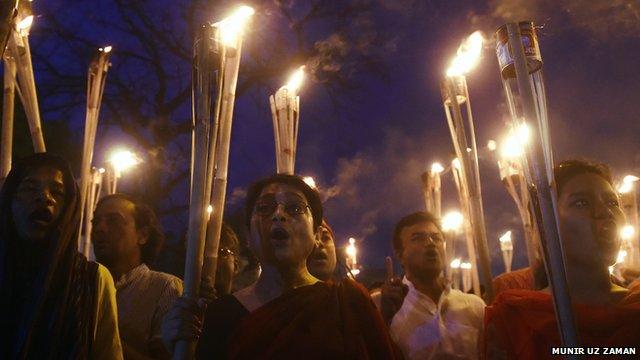Bangladesh bloggers: Clear pattern to killings
- Published
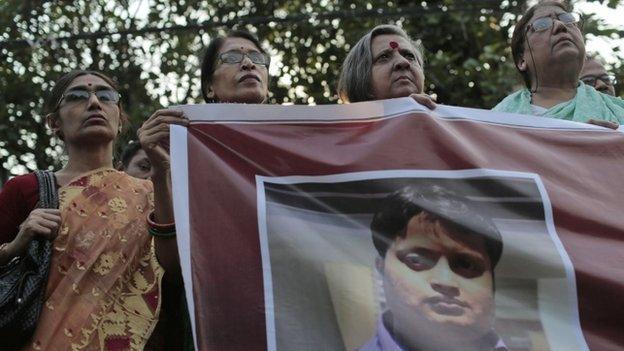
The murder of blogger Ananta Bijoy Das in Bangladesh has gone some way to show there is a clear pattern to recent killings of atheist thinkers in this largely Muslim country.
Ananta Das is the third atheist blogger to be killed this year, external. And he is the fourth blogger hacked to death since February 2013, when Rajib Haider was murdered near his home.
All these killings were carried out in near identical fashion. The victims were targeted in open, public spaces - and hacked to death with machetes or similar weapons. In each case the killers targeted the head and neck, ensuring almost certain death.
This pattern has convinced observers that the killers, even if they are from different parts of the country, as being advised or trained by one group.
Anonymity punctured
What secular thinkers in Bangladesh, concerned about their own safety, find most worrying is the way the bloggers are being identified, tracked and attacked.
Washiqur Rahman, who was killed in Dhaka in March as he left his home to go to work, used a pen name for his blog. He never used his picture anywhere. Yet, the attacker identified him and located his home.
According to police, two of Rahman's alleged killers, who were caught by passers-by and handed over to the authorities, were madrassa (religious school) students who had never met each other before.
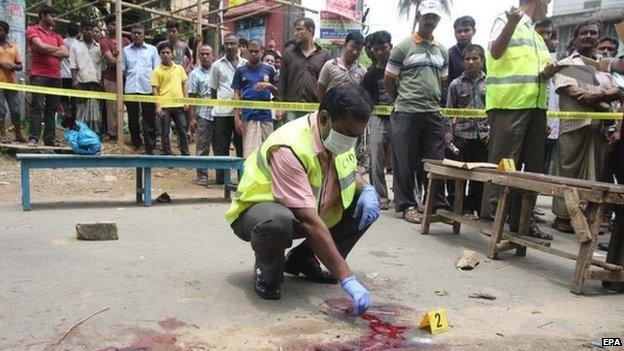
The bloggers were all cut down in broad daylight with sharp weapons
One was recruited from a madrassa in Chittagong and the other in Dhaka.
This suggests the killings could be the work of one extremist group with an extensive network of online researchers and informers on the ground.
The deaths are reminding people of the last days of Bangladesh's independence war against Pakistan in 1971. In December of that year, more than 200 writers, professors, poets and other secular-minded intellectuals were abducted from their homes by a fanatical Islamist group called al-Badr.
Many of the intellectuals were never found again. Bodies were found with bullet holes, the victims having been blindfolded and their hands tied behind their backs.
Leaders of Bangladesh's Jamaat-e-Islami party, which collaborated with the Pakistani army in 1971, were accused of forming and leading the al-Badr. In 2010, Bangladesh set up the International Crimes Tribunal to put these Jamaat leaders on trial for war crimes.
In a way, the current spate of killings was triggered, not so much by the trials themselves, but a particular event that sought to change the course of the trials.
Rajib Haider's murder happened in the wake of mass rallies in the centre of Dhaka demanding the death penalty for an Islamist leader convicted of war crimes and given life imprisonment.
The rallies were organised and led by young secular online activists and bloggers. These rallies drew secular-minded people in their tens of thousands, forcing the government to amend the law which allowed prosecutors to appeal against Jamaat-e-Islami leader Abdul Quader Mollah's life sentence.
Islamist backlash
But the high-profile role played by the atheist bloggers, some of whom were known to attack Islam in their writings, caused a huge backlash from a variety of Islamist organisations based in madrassas across Bangladesh.
These groups, combined under the banner of Hefajat-e-Islam, published a list of 84 bloggers whom they accused of blasphemy and demanded they be punished.
Hefajat-e-Islam then proceeded to hold two huge rallies in Dhaka which threatened to topple the government.
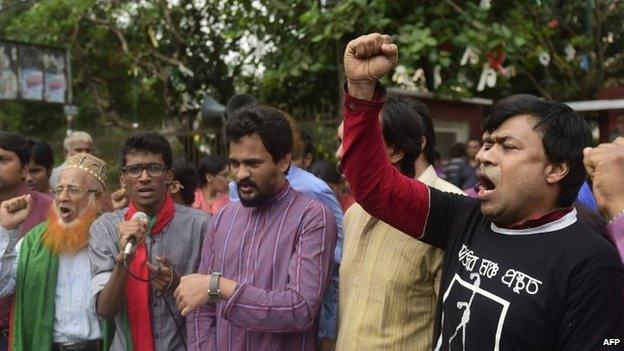
Trials of leaders accused of war crimes have pitted secular activists (seen here) against Islamists
Since then, the government of Prime Minister Sheikh Hasina appears to have reached an accommodation with Hefajat. The Islamist group has confined itself to the madrassa premises and the government has put five bloggers in jail for allegedly hurting the religious feelings of Muslims.
The government now appears to be walking a tightrope.
There is little doubt the prime minister wants to pursue a secular future for Bangladesh. But she appears to have little time for atheists who are on a collision course with Islamists.
The bloggers don't just want protection from killers and justice for those murdered - they also want to enjoy the freedom of speech that is enshrined in the constitution. The government does not seem to think that freedom should stretch to the criticism of religion.
And Islamist extremists want to strike terror into the hearts of such writers and bloggers through targeted killings.
- Published12 May 2015
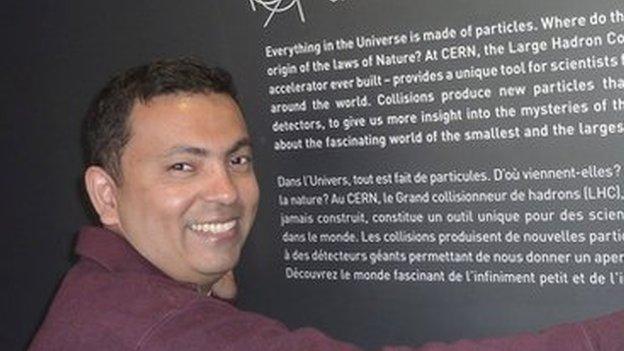
- Published12 May 2015
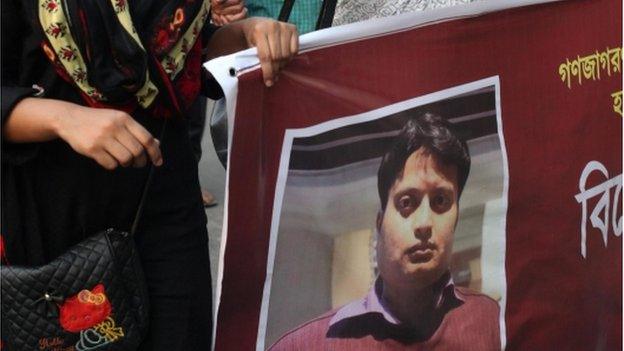
- Published30 March 2015

- Published30 March 2015

- Published10 March 2015
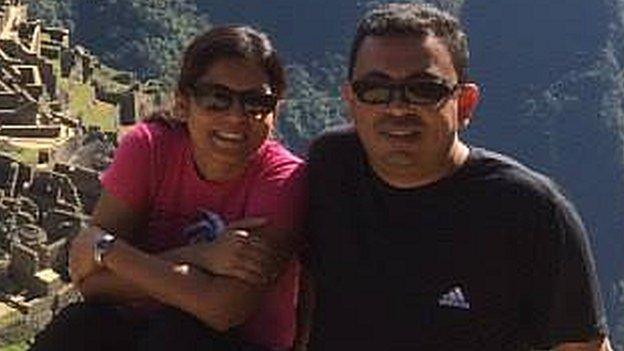
- Published2 March 2015
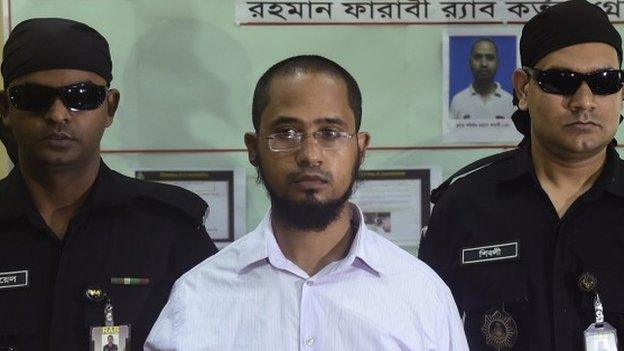
- Published27 February 2015
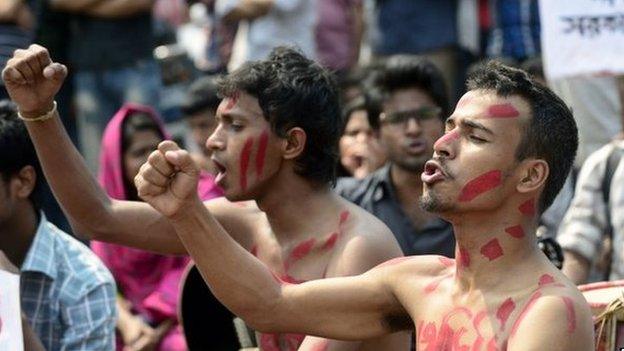
- Published27 February 2015
